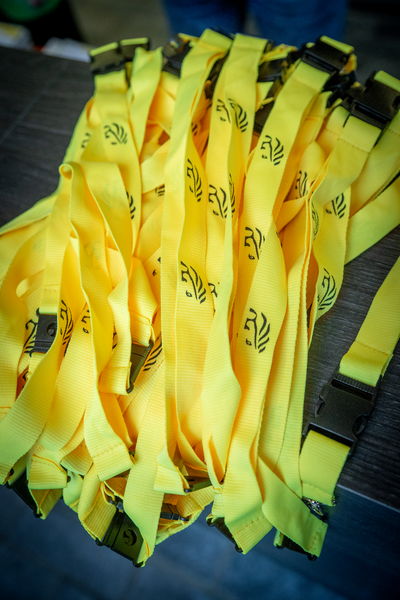Inclusion is the trunk, accessibility is a branch
Interview with Gabrielle Austen Browne, keynote speaker at Meet in Flanders Academy
On December 5, the Meet In Flanders Academy will take place again. VISITFLANDERS Convention Bureau organizes this six-monthly learning event for partners from the conference sector. This edition - for which the beautiful venue of the Concertgebouw in Bruges is rolling out the red carpet - is entirely dedicated to a topic that concerns us all: inclusivity.
A fascinating theme calls for a fascinating headliner - and that will be none other than Gabrielle Austen Browne. The founder of Diversity Alliance offers consultancy on diversity, equity, inclusion, and accessibility, specifically within the events, meetings, and hospitality sectors. So she really is an expert on the subject.
A career path combining events and DE&I
Gabrielle started her career as an event producer before shifting her focus to DE&I (Diversity, Equity, and Inclusion). She did her masters in 2009 in Community Dance specialising in inclusion and accessibility, then she worked in the events industry from 2015 till 2020. From 2020 she started with her own company.
Gabby worked on various community projects, using dance as a medium for self-expression and promoting physical and mental well-being. She worked with ex-offenders, residents of old age homes, young people, and adults with disabilities.
Today it feels like Gabrielle has come full circle, bringing together her experience in events with her passion for inclusion and accessibility. At the Meet in Flanders Academy, she will be focusing on what it truly means to say that "everyone is welcome" at your meeting or event.
It is not about charity or helping the less fortunate
Gabrielle Austen Browne: "the notion "Everyone is welcome" is about creating spaces and experiences that are inclusive, representative, and accessible to everyone, whether it's a digital experience, sensory experience, or social aspects. This includes accommodations for people with various disabilities.
We need to think about many factors to ensure inclusivity, which makes this work very exciting, especially for those who are creative problem solvers. It involves how we design or deliver events, select venues, choose speakers and performers, and even decide on catering. I want to relay to everyone that this is not about charity or helping those less fortunate. It’s about acknowledging that we all have different needs and experiences.
The aim is to be welcoming to all stakeholders, including delegates, visitors, colleagues, and suppliers. Event agencies, in particular, often excel in this area because they naturally adopt a creative mindset when designing experiences for their clients. They are used to designing everything from exhibition stands to interactive activities, and they just need to extend this creativity to include accessibility considerations."
How conference and event organizers can improve accessibility
"It's important to think holistically about accessibility and inclusion. It’s not just about physical infrastructure, but about every aspect of the experience. When event planners and producers design experiences they consider the attendee journey from start to finish. From social media and websites to emails and newsletters, each touchpoint should represent different groups inclusively through language and imagery.
Consider how to make the experience accessible for everyone, such as caregivers, parents during school holidays, or people with disabilities. Putting ourselves in others' shoes and asking for input from diverse communities can greatly enhance our understanding and improve accessibility. Engaging with disability organizations, LGBTQIA+ communities, and other diverse groups can provide valuable insights.
By asking these groups for feedback and considering their experiences, we can create more inclusive and welcoming events for all attendees."
Inclusion is the trunk, accessibility is a branch
“I also want to make it clear that there is a difference between inclusion and accessibility. I see accessibility as an element of inclusion. Inclusion is the trunk, and from it branch out different aspects, one of which is accessibility. This branch includes physical accessibility, neurodiversity, mental health, and visible and invisible disabilities. Other branches might represent gender identity and expression, LGBTQIA+ inclusion, race and culture, socio-economic status, age and life stage, and faith and beliefs. While accessibility is crucial, it doesn't encompass the entirety of inclusion. It's primarily about how people access something, but inclusion also means representing everyone."
Up to 80% of disabilities are invisible
"Research has shown that 88% of attendees feel more confident when provided with detailed information about the event format and venue layout in advance. This simple communication can significantly impact their decision to attend and their overall experience.
Another important statistic is that around 70-80% of disabilities are invisible. Personally, I've struggled with conference and exhibition settings due to sensitivity to lighting and sound. While I might not identify as neurodivergent, these are challenges I face, similar to many others who experience invisible disabilities. It highlights the need to be mindful of diverse needs, even those that are not immediately apparent."
Getting the act together at the Meet in Flanders Academy
"During my talk at the Meet in Flanders Academy, I will touch upon workshops and sessions that focus on aligning communication strategies with all forms of inclusion, whether cultural, learning, or language-based. We are implementing captioning for those who are hard of hearing or prefer reading while listening, with captions available in both Dutch and English. This demonstrates our commitment to inclusive communication, ensuring everyone can absorb information in their preferred way.
From a digital perspective, it's often underestimated how many people require accessible digital experiences. About 20% of people use accessible software like screen readers, which is not a small percentage. Therefore, it's crucial to communicate clearly about the availability of these accommodations."

Want to know more about inclusivity and your conference in Flanders?
Your contact person
Free inspiration for your next conference
A successful conference is one that inspires. That’s why we offer you here tons of inspiration. For a conference in your domain, for your conference in Flanders.